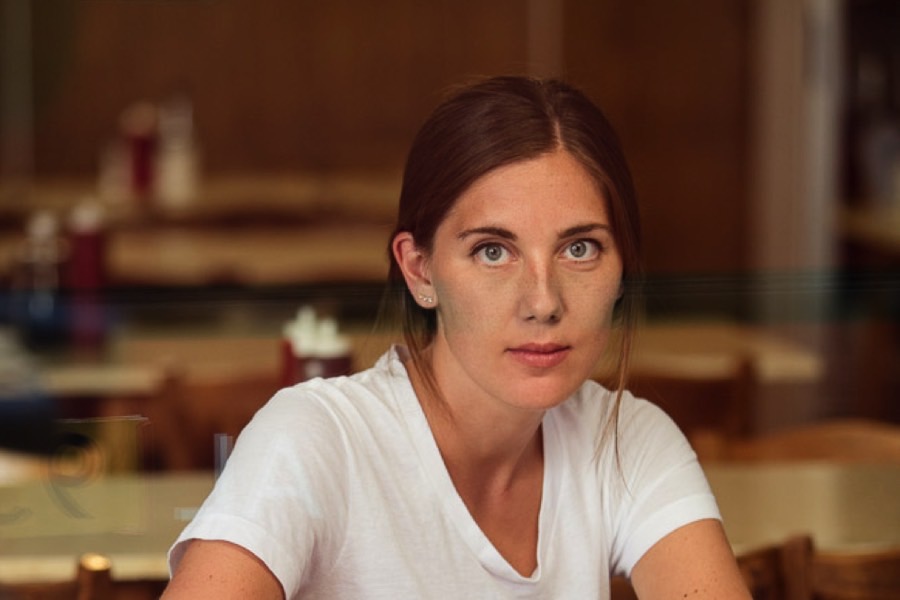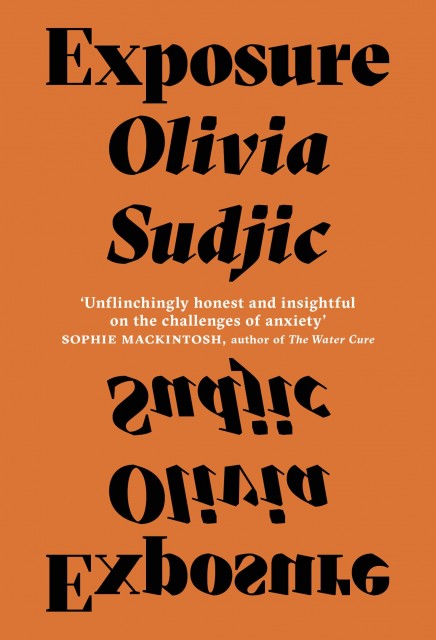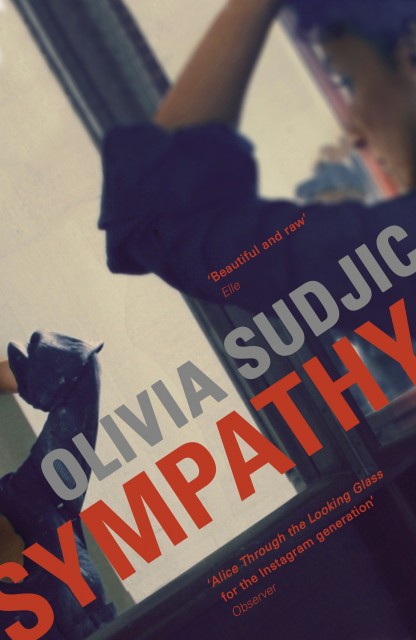“It’s hard to compete with the pocket magic of a smartphone.” The Big Interview: Author Olivia Sudjic

Lucy Holt speaks to author Olivia Sudjic about her new book, Exposure, digital criticism, “talismanic” female writers and tangible publications…
Olivia Sudjic’s debut novel, 2017′s Sympathy, traced protagonist Alice Hare’s adventures down the digital rabbit-hole. Obsession – directed mostly towards a woman she believes to be her “internet twin” Mizuko Himura – anxieties, loops and mirror-images populate both the digital and the urban world of the book. Exposure, published this year, is a pocket essay reflecting on Sudjic’s own encounters with digital criticism and the double-standards contained within it, in which she invokes a series of “talismanic” female writers. We spoke online about the two texts, dissonant spaces, and the magical properties of the message thread.
The Double Negative: The fractured notion of writing online might be an interesting place to start our correspondence. Your novel Sympathy is structured so we encounter Alice’s story in non-linear episodes. I wonder whether if you think some of our anxieties about existing in the online world are motivated by the desire to tell a coherent narrative about ourselves?
Olivia Sudjic: I agree incoherence is, certainly for me, one of the main anxieties for individuals using the internet (or the other way round) and also in the ‘internet/post truth age’. In direct answer to your question, yes, we want to tell coherent narratives of the self – we have little else to depend on – as well as freedom from traditional moulds. It feels important to define ourselves at least, given that many people feel so disenfranchised from other forms of power. While social media enables this, the power seems to be an illusion – as with a gambler or addict who thinks it is they who are in control. The coherence, from our perspective, is unravelled the more we see ourselves atomised as data, ceding control in ways we don’t fully understand to the social media companies, advertisers, to powerful surveillance, and without the power to edit/erase what we think of us as past selves.
Some people liken the push/pull of online selves for any one person as schizophrenic. I don’t see it that way, or I don’t know what it’s like to be schizophrenic, but I do think such incoherence destabilise our sense of self. I’ve just finished watching Natasha Lyonne’s Russian Doll and there is something about that idea of repeating your life story over and over to try and correct it and make it coherent that ultimately makes it seem absurd and totally out of one’s control. Like repeating a word until it loses meaning.
I’m thinking about the line from Mizuko’s book (in Sympathy): “Origin stories make us feel secure; untangling them can undo us”.
In that line of Mizuko’s, to me the suggestion is that such stories, whether for individuals or the universe, work best seen from far away, through the fog of myth. Looking too closely, or beneath the surface of these stories (eg the 23andMe personal genome kits, or, say, if everyone who used Facebook actually learned how to code, or if we all became particle physicists etc) reveals machinery like algorithms, or even chaos, forces we’d prefer to think of as fate.
Is there perhaps a trope of repetition ad absurdum in Sympathy? Mizuko gets “stuck” applying lipstick over and over and at one point she posts a sequence of images of herself holding images of herself, which Alice likens to “a loop that takes you back where you started”. It’s a sort of glitchiness, or that Russian Doll effect.
There is. The mise en abyme/droste effect, the references to Alice Through the Looking Glass, the ending with the spinning wheel, the spiral nature of the plot. It’s been some time since I thought about these details, but they were all intended to convey the sensation that Alice is no longer in control, being led along by predictions.
I couldn’t help but notice that Exposure was published in pocket essay format, not physically unlike a smartphone.
Yes! Those decisions weren’t made by me, but I knew that would be the format when I started writing. I liked the idea of the text I was creating hopefully being in some way talismanic – as the texts I was writing about were for me. It was easy to forget that though when I was writing on my laptop.
I suppose things that sit only on shelves in hardback have a hard time getting people’s attention these days. It’s hard to compete with the pocket magic of a smartphone. But there are so many ways that the internet has helped shape writing in productive ways. I think the lines in literature are so blurred now between categories and genre, and we have the internet to thank for it.
The personal essay came into its own online. People no longer expect distinctions such as time, place, context, to keep different kinds of text separate. But I think that is also perhaps why writers like Chris Kraus are now so widely embraced compared to when ILD [I Love Dick] originally came out. It’s ok to have that collage. We’re used to having an advert about underwear pop up next to a news article about a war at the same time as we’re replying to a personal email etc. Our brains can cope with new things that might have once seemed prohibitively incoherent. Now that incoherence just feels true.

Exposure begins with the phenomenon of Saturn’s Return, as well as to the talismans you’ve mentioned. There’s also a current trend in publishing, especially publishing by young women (Ignota Books, for instance) of writing about the astrological and the occult, not to mention the seemingly recent proliferation of memes referencing astrology online. I wonder what in particular drew you to writing through these sorts of metaphors, and whether you think astrology trends might have emerged in response to our online lives?
I do, in part. Or rather to our lives now, which yes is lived in largely online, outside of natural laws of time and space in that sense, and where certain other kinds of rules have disappeared. Uncertainty is more prevalent for us than for Baby Boomers, and it’s more like living in an era where once magic and religion stepped in to give anxious people coherence, comfort and structure. There’s also something about such ritual ideas etc that is unifying, that feels like following an established path which I think many people want in place of the dead ends they are faced with – capitalism, patriarchy for example.
I actually started my first book Sympathy not with the idea of modern tech, but that it was a historical novel that dealt with sympathetic magic (look up sympathy powder if you’re not familiar with it) that I first encountered while studying Robert Fludd for a module at university, then encountered again in Dava Sobel’s Longitude, and it also crops up in The Island of The Day Before – Umberto Eco. I then realised that the internet is basically the modern manifestation of such magic. Technology is magic, which is something I’ve read Ignota Books say in so many words.
As well as being hilarious, the recent viral success of Bougie London Literary Woman on Twitter tapped into a sort of female online performativity that felt incredibly ‘of the moment’.
I read one of its creators’ explanations for the project and I thought she explained it very well, the impulse behind it as well as the impulse of followers to project certain types of paranoia onto it. It was a man, etc. I thought it was also interesting that many people decided it was a veiled attack on a specific individual. The fact that it seems multiple people decided it was about multiple different people specifically (and mutually exclusively) seems telling. It reminded me of the way that readers of my novel assumed certain characters were based on so-and-so, and five different people were sure it was about five different people. There is something about that which suggests a novel – or a satirical Twitter account – has succeeded on a certain level. Using the personal and the specific to get at something much more essential.
I’m glad I read one of the crypto-author’s own words on it, but she noted that in the end, an author’s intention doesn’t take precedence over how it’s perceived by readers. It’s not for them to say what the piece does, they lose control over the performance. But I think when the author is making a point about performativity, that’s a clever symbiosis. She’s doing it for us, or for herself? Who’s performing what to who? Some of the backlash against it was a performance in itself.
I think it’s also interesting that there were actually two women creators behind it, and they composed the tweets through a process of refining each other’s messages, and getting instant feedback. They performed for each other and seemed not to expect the much wider audience they got.

Interesting you mention collaboration in the private message thread or group chat. I’m fascinated about those spaces, as I think a sort of excitable, tangential magic can happen. Do you see those types of digital exchanges as generative in any way?
Definitely. Artists/writers who were historically (since the Renaissance, I guess) prized for originality and individual genius, aren’t usually thought to be working as scientists are. It’s seen as an academic’s role to uncover/reveal influence – take the Barbican’s Modern Couples exhibition. It seemed to state the obvious – artists inform each other’s work (eg Bauhaus) but the magic often comes from intimate relationships. With science the push/pull is vital and expected. It’s not about “muses” but conversation. One idea is built upon to make another breakthrough, part of which is then disproved by another and so on. Science relies upon this entanglement. With digital communications (invented for CERN scientists, to share their ideas and research) we have to perform on the spot. More like improv than when people wrote letters. Still, it’s a pity we won’t have letters preserved between people – there needs to be, if there isn’t already, a tech company preserving this kind of encrypted private messaging for the future with timed publication in a hundred years’ time.
I read Sympathy alongside Olivia Laing’s Lonely City. There seems to be a parity between the idea of the woman walking the city and the woman navigating the digital realm. The language of online behaviour is often the language of urban movement; stalking, following, browsing, grids etc, and then when Rebecca Solnit talks about the “aerobic sisyphus” of walking the treadmill, I think of a digital sisyphus – of online scrolling through an infinite conveyor belt of images. So, I wonder what your relationship with walking and writing the city might be?
Tellingly perhaps, this second novel is concerned with cycles of history, repetition, the desire to stop and rest, and for happy ever after endings. The logical conclusion, I think, to a book like Sympathy which ends with the wheel spinning as she insistently hits refresh. My second non-fiction – which is a collection of personal essays is themed around desire lines – paths that run counter to formal planning. It is going to deal in navigation, how women navigate the world in all kinds of ways.
Appropriately I’m headed off on a kind of tangent now. But the personal essay is a desire line. In order to write, I walk. (I’m worried I sound like Bougie Literary Woman now.) These meanders connect me to my environment, writing is the way I impress it. On a walk along a Norfolk coastal path, I asked a male friend if he knew the term ‘desire lines’. His answer: “Is it something to do with consent?”. Sorry this is not very coherent (!) I think the briefest way to answer this (which is a nebulous book in my head) is that I am keen on [activist and writer] Jane Jacobs.
I really like that mis-reading of desire lines as related to consent which – if thought of as bound up with thresholds and intimacy – they sort of are?
Absolutely. They are acts of civil disobedience. Autonomy but also connection. And once one is made in a landscape, others tend to follow the same path, so there’s a kind of social cue when you see one. It gives you permission. Or an invitation. So what might actually be a very indirect or dangerous path made by an eccentric individual is then normalised.
Later, after this interview was conducted online, I went to see Olivia read at The Second Shelf bookshop in London alongside other contributors to Ache Magazine. The magazine publishes women’s’ responses to issues of wellness, health and pain. Not long into Olivia’s reading, a man stumbled across the packed bookshop and took offence at the “women only event” (it wasn’t). He began hurling angry verbal abuse to such a degree we locked ourselves inside the shop for safety. It was a disturbing example of why women’s’ writing and speaking has — often by necessity — made the digital its alternative terrain, but also of the importance of these (real) spaces and (tangible) publications, and of the silencing that a retreat into the private and the encrypted often allows.
Lucy Holt
Sympathy, published by Pushkin Press (2018), and Exposure , published by Peninsula Press (2018), are available now. Sudjic’s next novel, Asylum Road, is forthcoming from Bloomsbury





